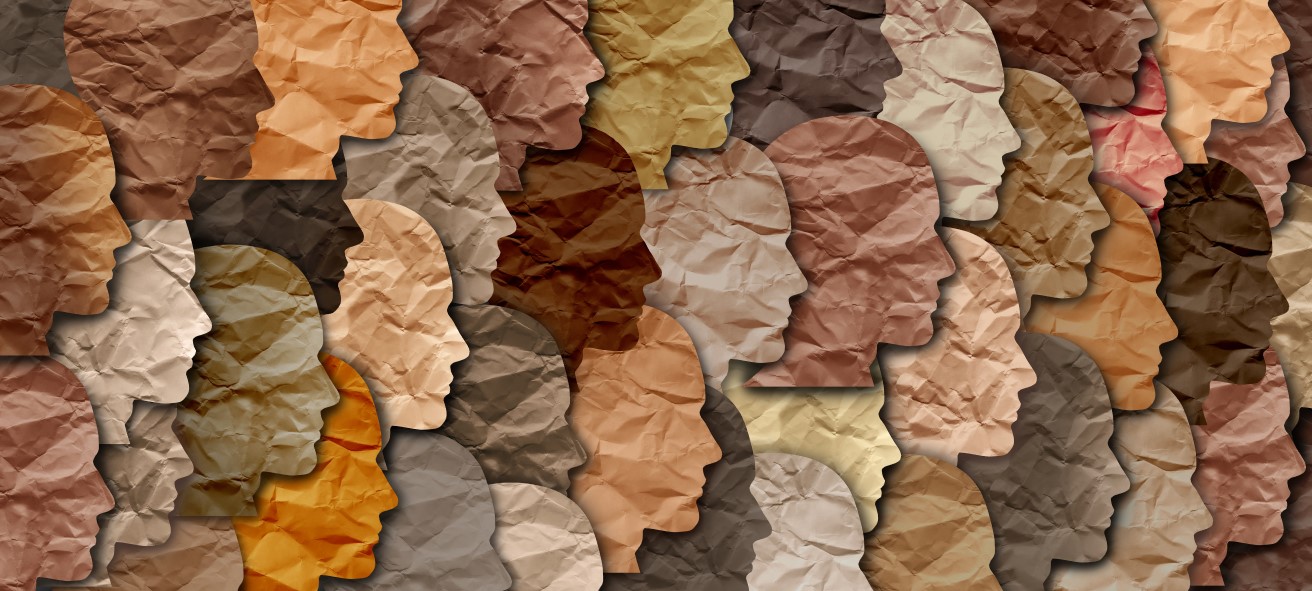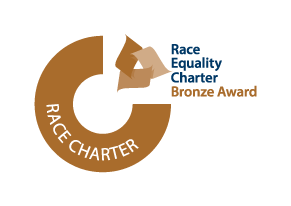Race
Race is a protected characteristic that refers to a group of people defined by their race, colour, nationality (including their citizenship) and ethnic or national origins. It includes factors such as culture and language.
Let's talk about race
The Equality Act
Race is one of nine protected characteristics under the Equality Act. Under the Equality Act 2010, race can refer to someone’s colour or nationality (including their citizenship), as well as their ethnic or national origins. Under this very broad definition, people cannot be discriminated against based on the colour of their skin, the place they were born or that they originated from, or the passport(s) they hold. For example, if someone originated from Bangladesh and now lives in Britain and has a British passport, they are protected under the act based on their national origins (Bangladesh) and their current nationality (British).
Unpacking race
Race is increasingly recognised as a social construct as opposed to something that has any credible or meaningful biological basis. Data generated from the genome project and subsequent studies of human genetics show how incredibly similar we humans are: we share over 99.9% of our DNA with one other. Race cannot be biologically defined because of the genetic variability within what would be called different races. Indeed, as highlighted in this blog, there is so much genetic variability and shared genetics amongst people, that it is possible for two people of European descent to be more genetically similar to someone of Chinese origin than to each other.
Talking about race
It’s important to approach the topic of race with sensitivity and respect. We need to be open and willing to listen to others, and to learn along the way. It’s good to be informed of the issues which surround and perpetuate race inequality to have meaningful dialogues. This toolkit will assist you in the self-directed learning which is necessary to get you started.
People who identify as White need to be part of the conversations in order to help dismantle racism embedded in institutional policies and practices. It’s not unusual to feel defensive and uncomfortable when talking about racial inequality and injustice, particularly if learning about white privilege for the first time. This has been coined as ‘white fragility’ by author Robin DiAngelo, and can help perpetuate racial inequalities. It’s important to overcome these feelings, engage in these conversations and listen to personal experiences. Avoid responses like, “I’m not racist” or “I was taught to treat everybody the same”, as it ends the conversation. By saying something like “I don’t see race” you are ignoring the problem rather than making an active effort to help solve it. Don’t engage in conversations simply to reassure yourself that you are not racist – instead think about what you can do to help and to take actions.
To find out more about engaging in meaningful conversations, check out the Inclusive Language Guide. Advance HE have also produced guidance on approaching terminology around race and ethnicity.
Race and racism
Racism
Racism arises from one identifiable group of people perceiving themselves to be different or superior to another. That source of difference is often based on how people look and behave, most notably on the colour of their skin. Angela Saini, author of ‘Superior’ Superior – The Return of Race Science – Angela Saini, talks eloquently about the origins of racism in the western world in this short video, and how historically, white people established themselves as superior to people who looked and behaved differently to them. In the past, this helped to justify the brutality and injustices of slavery and colonialism, but these historical roots and hierarchies are still impacting on people’s lives today because of many traditional structures.
Racism has many forms. Most obviously, it can be evident, making it relatively easy to spot and address. However, racism is often more subtle and hidden, which can make it harder to recognise, define, and call out. Microaggressions, such as always pronouncing someone’s name wrong, may not be recognised or acknowledged by those people doing it, and can be difficult for others to define and challenge. However, these have cumulative and significant negative effects on people and need to be addressed. Racism also exists and has become embedded into social, economic and political systems. This is known as structural or systemic racism, and perpetuates ethnic inequalities in, for example, healthcare, education, and criminal justice systems. Scrutinising and changing policies, practices and cultures within organisations is required to tackle systemic racism.
Although anti-discrimination laws exist to protect and include people from a diverse range of backgrounds, racism affects many people’s lives every day in the UK, and inequalities are prevalent across society for adults and children from minority ethnic groups (all ethnic groups except White British). In higher education, for example, people from ethnic minority backgrounds are less likely to attend university (particularly those more prestigious institutions) or to attain a first or 2:1 degree (the ethnic attainment gap) compared to White students. In 2020, the impacts of racism were brought to the fore, through the disproportionate impact of Covid-19 on people from minority ethnic backgrounds in the UK, the death of George Floyd in the US, and the Black Lives Matter protests worldwide.
The British Research Council has produced a Race Equality Guide which includes a useful framework for understanding racism. There are also actions and examples which can be used as a practical guide.
Understanding white privilege
Author Renni Eddo-Lodge defines white privilege as “an absence of the negative consequences of racism… White privilege is the fact that if you’re white, your race will almost certainly positively impact your life’s trajectory in some way. And you probably won’t even notice it.” It does not mean that because you are White you have never suffered from any disadvantages - it means that your race didn’t add to your disadvantages.
White privilege accumulates through the advantages and benefits you may have if you identify as White. This privilege occurs in many levels in society, such as education, work and healthcare. For example, if you are White and you are pulled over in your car by the police, you probably will not fear being racially profiled because of your skin colour. This is something White people don’t experience.
Consequently, white privilege can be invisible. For example, if you identify as White and you don’t have any Black friends or close colleagues, you may never hear about their experiences. You will remain blind to your own advantages as it’s the only experience you know, and not understand the racial inequity in society. You can continue with your daily life being unaware of the privileges you have from being White, and without understanding the impact it has on others. This is why it’s important to listen and learn from others and take time to understand the impact of racism in society.
White people may often feel shame or guilt when learning about White privilege, particularly with the realisation that although not seeing themselves as racist, they may be unintentionally compliant. This is normal and okay. If you identify as White, recognise the power you hold to change the system. You can use your privilege and influence to fight racism. It’s important to recognise white privilege, as racial inequalities exist and affect people on a day-to-day basis. Once you accept that this privilege exists, you can help dismantle the system that perpetuates it. You can be an anti-racist ally.
It is important to take the time to do self-directed learning. You shouldn’t burden people from ethnic minority groups with the responsibility to educate you, but you can ask trusted people questions in a sensitive way if appropriate. Jasmine Read has listed ten actions that White academic or higher education professionals can take to support Black faculty, colleagues, and students. You may also wish to read Reni Eddo-Lodge's book Why I’m no longer talking to White People about Race and Layla F. Saad’s book Me and White Supremacy which covers how to recognise your privilege and combat racism. David Olusoga’s Black and British book addresses how Black British history is woven into the cultural and economic histories of the nation.
What is being 'anti-ractist'?
Professor Robert J. Patterson defined anti-racism as “an active and conscious effort to work against multidimensional aspects of racism”. The aim is to challenge racism and actively change the policies, behaviours, beliefs and attitudes that perpetuate it.
In order to be anti-racist, it is important to shift our attitudes towards racism. We need to understand that it’s not just a racist slur in the street. Racism becomes embedded in institutional practices and policies. Conscious and active efforts from everybody are needed to dismantle it. Anti-racism is the commitment to fight racism at every opportunity, including within yourself.
You may think, “I’m not racist, surely that’s good enough?” You must recognise how embedded racism is in society and take time to learn how people are disadvantaged by it. This is a societal problem, not just an issue for ethnic minority communities. As author Robin DiAngelo stated, “racism is a White problem. It was constructed and created by White people and the ultimate responsibility lies within White people.” It is necessary to take ownership and take action. Listening to the experiences of others and how attitudes and policies affect them can be very valuable. Wellcome have summarised their principles on becoming anti-racist.
To learn more about being an anti-racist ally you can check out this Anti-Racism Toolkit. You may also wish to read How to be an Anti-Racist by Ibram X Kendi.

Race in academia and research
Under-representation in academia, particularly in senior positions
Whilst higher education and academia becomes increasingly ethnically diverse, inequalities persist. People from minority ethnic backgrounds are under-represented at undergraduate and postgraduate levels and there is a national drive to widen participation and improve access to higher education in the UK. There is also under-representation among academics, which worsens with increasing seniority in academic roles. Academic colleagues from ethnic minority backgrounds are more likely to be on fixed-term contracts and leave academia, and less likely to become a professor or reach a senior management position.
Advance HE reported only 0.8% of professors are Black, 2.3% are Chinese, and 4.6% are Asian in their report for the 2022-23 academic year. You can access Advance HE’s latest report figures on professor breakdowns by ethnic group by searching in their Knowledge Hub. UK Research and Innovation (UKRI) also produce Annual Diversity Data Reports and detailed ethnicity analysis.
Challenges in academia for under-represented groups
There are many reasons behind these stark figures and depressing loss of talent. Some happen in everyday situations that affect peoples’ everyday lived experiences. Researchers from ethnic minority groups report feeling unwelcome, invisible, unrecognised and undervalued for the work they do. They feel marginalised, and worse, discriminated against. They find their leadership or abilities called into question in a way that feels based on assumptions about their race. They report having more heavy teaching loads, and fewer role models, mentoring and career development opportunities compared to White colleagues. This can negatively impact on the opportunities to develop their research portfolio and enhance their prospects for promotion. UKRI's Diversity data show that grant applications from colleagues from ethnic minority backgrounds are less likely to be successful compared to White applicants, and less than 1% of funded research fellows identify as Black. UKRI has also published ethnicity analysis of funding applicants and awardees.
The Race Equality Charter offers a framework for universities in the UK to facilitate self-assessment and long-term change. Numerous research studies and reports show barriers to researchers from ethnic minority backgrounds in progressing their careers, including biases in hiring processes and being awarded smaller grants.
Kalwant Bhopal has written about how to start dismantling White privilege in higher education. They argue that to address this problem requires radical action from universities, which must start by acknowledging the existence of institutional racism and white privilege. You can also read their book White Privilege: The Myth of a Post-Racial Society. As a leader in research, you have a responsibility to contribute towards advancing race equality, either in your individual capacity or in the roles you hold.
Misnaming
Many colleagues and students regularly have their name misspelt or incorrectly pronounced on a daily basis. Names are part of our identity and for many individuals names are a connection to their race and background. The impact of misnaming can make individuals feel unappreciated, lack a sense of belonging and impact on confidence. The #mynameis campaign encourages to normalise colleagues putting the pronunciation of their name in their email signature. You can check out a Wonkhe article that looks at the impact of misnaming people and a blog post discussing the lasting impact of frequent misnaming. If you pronounce a colleague or students name wrong you should apologise, thank the person for correcting you and ensure you take this on board for next time. You can find out more about the impacts of misnaming on our Allyship Guide.
Collecting data around race
Collecting research data on ethnicity
Billie Moffat-Knox from the School of Psychology has collated some information around inclusive language and appropriate response options for collecting data about participants’ gender, sexual orientation, sex (if relevant), ethnicity and disability/neurodiversity/health conditions. Collecting and reporting this data improves the representation of individuals within scientific research.
Below are some examples of how to ask participants what their ethnicity is.
1. What is your ethnic group?
- Arab
- Asian or Asian British
- Black, Black British, Caribbean, or African
- Mixed or multiple ethnic groups
- White
- Other ethnic group - Please describe your ethnicity: [open text-entry box]
- Prefer not to say
2a. If Asian or Asian British is selected:
Which of the following best describes your Asian or Asian British background?
- Indian
- Pakistani
- Bangladeshi
- Chinese
- Any other Asian background
- Prefer not to say
2b. If Black, Black British, Caribbean, or African is selected:
Which of the following best describes your Black, Black British, Caribbean, or African background?
- Caribbean
- African
- Any other Black, Black British, or Caribbean background
- Prefer not to say
2c. If Mixed or multiple ethnic groups is selected:
Which of the following best describes your Mixed or multiple ethnic group background?
- White and Black Caribbean
- White and Black African
- White and Asian
- Any other Mixed or multiple ethnic background
- Prefer not to say
2d. If White is selected:
Which of the following best describes your White background?
- English, Welsh, Scottish, Northern Irish or British
- Irish
- Gypsy or Irish Traveller
- Roma
- Any other White background
- Prefer not to say
What actions can you take?
What actions can we all take? As a researcher, research enabler or leader in research
Even if you personally haven’t experienced or witnessed racism, there’s lots you can do to be an ally to those who are affected, and to challenge and take actions to address systemic racism where you see it.
- Be open to learning and educating yourself about race. It is not up to people affected by race issues to educate you. Self-directed learning about race issues is important and will help you become confident in engaging in conversation. Check out the section below, ‘Learn more and explore’, to find out about allyship and further resources to engage with.
- Take time to understand the experiences of people from minority ethnic groups. There’s a lot to listen to and read on the web on personal experiences of working in academia and a broad range of topics (including White privilege, institutional racism, and why change is so slow).
- Take time to understand the historical narrative of racial inequalities today. Some recent books explain the context of modern racism in the UK, and can help you understand how the enormous social injustices of the past play out today.
- Don’t shy away from talking about race. It will probably feel uncomfortable, but we need to start. Make sure that you know what you want to get out of a conversation, and if you approach it in the right way, it will build your confidence for future discussions. You can then actively encourage constructive conversations on race. Check out the Inclusive Language Guide for our guide to conversations about race.
- Don’t make assumptions. Don’t make assumptions about someone’s race or identity.
- Reflect on attitudes and behaviour. The small things that we do or say, even in a jokey way, can impact on people. We need to make sure that we treat everyone in a way that allows them to develop to their full potential, and equal opportunity to contribute to our research and achieve success. Perhaps take a moment to think about how we do that when we recruit, evaluate, support, listen to, mentor, and sponsor individuals.
What additional actions can you take as a leader in research?
- Consider your leadership style. Try to make sure that you are open and actively promoting race equality and being anti-racist within your collaborative teams and wider spheres of influence, and that you are appropriately valuing everyone’s contributions.
- Diversify your teaching practices and help decolonise the curriculum. Incorporate diverse examples in your teaching. Your students from ethnic minorities need role models, and this is difficult to do when there is little representation in the teaching content.
- Use leadership roles (inside and outside your university) to challenge processes, practices and behaviours that are barriers to achieving racial equality. Be bold and role model behaviours that can help achieve racial equality.
Learn more and explore

Throughout this page we have linked to articles, studies and books which you can explore to increase your understanding of race and race discrimination. You may also wish to check out our page about Allyship to help understand the various ways that we can be an ally to support our colleagues and students.
We recognise that not everyone has the same learning styles, so to complement some of the written information and resources listed throughout this section, below there are a range of video and podcast recommendations to engage with, as well some further research articles that may interest you.
The Newcastle University Library site also hosts a guide to highlight useful information around race equality. You can also check out our EDI Toolkit Reading List on the library’s EDI page for a summary of books to engage with around the protected characteristics.
Research articles
- Topic choice contributes to the lower rate of NIH awards to African-American/black scientists – Hoppe et al 2019
- Out of place: Black women academics in British universities – Wright, Thompson & Channer, 2007
- Academic flight: how to encourage Black and minority ethnic academics to stay in UK higher education – Bhopal, Brown and Jackson (2015)
- What happens before? A field experiment exploring how pay and representation differentially shape bias on the pathway into organisations – Milkman et al, 2015
- An Examination of the Impact of Minority Status Stress and Impostor Feelings on the Mental Health of Diverse Ethnic Minority College Students – Cokley, McClain, Enciso, & Martinez (2013)
- Walking the walk: Advice for anti-racist academic leaders – Sukhera and Palaniyappan, 2022
- Academics of colour in elite universities in the UK and USA: the 'unspoken system of exclusion' - Bhopal, 2022
TV and Film
- When They See Us
- Detroit
- 13th (Netflix)
Videos
- Uncomfortable Conversations with a Black Man
- Eliminating Microaggressions- The Next Level of Inclusion
- Confronting Racism in Higher Education webinar
- Angela Saini on race and colour-blindness in the UK
- Why you should not bring your authentic self to work | Jodi-Ann Burey
Podcast and Radio
- Dismantling White Fragility
- Unlocking Us with Brene Brown
- About Race with Renni Eddo-Lodge
- Intersectionality Matters! with Kimberle Crenshaw
Books
- Anti-Racism in Higher Education: An Action Guide for Change – Arun Verma
- Why I’m no longer talking to White People about Race – Reni Eddo-Lodge
- Me and White Supremacy – Layla F. Saad
- Black and British– David Olusoga
- How to be an Anti-Racist – Ibram X Kendi
Blogs
Feeds to follow
- @Languagematters.ncl (Instagram)
- @NU_RaceEquality (Twitter)
For Newcastle colleagues and students
Below you will find a list of services and resources available to colleagues and students at Newcastle University. You may find it useful to be aware of these either for yourself or to direct members of your team to.
NU-REN Network
The NU-REN Network (Newcastle University Race Equality Network – formerly BAME Staff & PGR Network) aims to create awareness of colour issues and provide a body which members can go to for support, as well as giving a voice to colleagues from ethnic minority groups. They strongly believe that for every University employee to reach their full potential, there must be no fear of discrimination or prejudice. You can sign up to join the network and their mailing list, and follow the @NU_RaceEquality Twitter feed. You can also get in touch via email.
Race Equality Charter
Newcastle has signed up to the Race Equality Charter (REC), and has a three-year action plan in place to tackle racial harassment and inequity. You can find out more about priority areas for action and plans for future work by watching a REC Webinar (ncl login required) led by our VC and members of the REC Self-Assessment Team, and download the slides from the event. The Newcastle University REC page contains further information and documentation. You can see the statement of solidarity with the BAME community from the University’s Executive Board following the brutal and senseless death of George Floyd. You can also follow the @NU_RaceEquality Twitter account.
NUSU Decolonising Pledges
In 2020-21 the Newcastle University Students Union sabbatical team began the Decolonising NCL campaign. This work includes working with Schools across the University to create ‘decolonising pledges’ for their curriculum.
Martin Luther King and Freedom City 2017
You may have seen the statue of Martin Luther King outside the Armstrong Building which was unveiled as part of Freedom City 2017 to mark 50 years since he received an honorary degree from Newcastle University.
Training courses and workshops
You can access training on the Learning Management System (LMS) that covers the topic of Race Discrimination and Overcoming Unconscious Bias (ncl login required). There are also specific workshops which cover Anti-racism and Allyship, as well as White Privilege.


